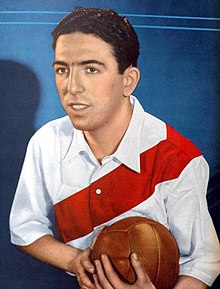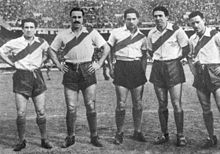sport.wikisort.org - Athlete
Ángel Amadeo Labruna (28 September 1918 – 19 September 1983) was an Argentine footballer and coach who played as a forward. With 323 goals scored in official matches, which include 294 league goals, Labruna is the 2nd all-time top scorer of Primera División after Paraguayan Arsenio Erico. Labruna was also part of the celebrated River Plate offense, nicknamed La Máquina (The Machine), and he was considered one of the best South-American footballers of his generation. In his career, Labruna scored 564 goals.[3]
 Labruna in 1940 | |||
| Personal information | |||
|---|---|---|---|
| Full name | Ángel Amadeo Labruna | ||
| Date of birth | 28 September 1918 | ||
| Place of birth | Buenos Aires, Argentina | ||
| Date of death | 19 September 1983 (aged 64) | ||
| Place of death | Buenos Aires, Argentina | ||
| Height | 174 cm (5 ft 9 in)[1] | ||
| Position(s) | Forward | ||
| Number | 10 | ||
| Senior career* | |||
| Years | Team | Apps | (Gls) |
| 1939–1959 | River Plate | 515 | (294) |
| 1960–1961 | Rampla Juniors | 16 | (3) |
| 1961 | Platense | 2 | (0) |
| 1961 | Rangers de Talca | 5 | (1) |
| Total | 538 | (298) | |
| National team | |||
| 1942–1958[2] | Argentina | 37 | (17) |
| Teams managed | |||
| 1968–1970 | River Plate | ||
| 1971–1972 | Rosario Central | ||
| 1973 | Racing Club | ||
| 1974 | Talleres de Córdoba | ||
| 1975–1981 | River Plate | ||
| *Club domestic league appearances and goals, correct as of 29 Dec 2018 | |||
Biography
Labruna was born in Buenos Aires.
Career
Playing career



Labruna's debut in the Primera División was in replacement of José Manuel Moreno who had been suspended by the club, wearing the number 10 shirt. The match disputed on 18 June 1939 in La Plata against Estudiantes, which defeated River by 1–0.
His goals scored and outstanding performances caused that Moreno had to play on the right side of the field when he was allowed to play again. Labruna played in River for 20 years, winning 9 domestic championships with the team (1941, 1942, 1945, 1947, 1952, 1953, 1955, 1956, 1957) and being the top scorer twice (1943 with 23 goals and 1945 with 25).[4]
He was part of his club's legendary team along with Juan Carlos Muñoz, José Manuel Moreno, Adolfo Pedernera, and Félix Loustau, where he played as an inside-left forward. Although this attacking line only disputed 18 games with those players, they were regarded as one of the best forward line in the history of Argentine football. They were nicknamed La Máquina (The Machine) due to their skills with the ball and synchronized play. Coach and former player Carlos Peucelle said that his team was formed by "A goalkeeper and 10 forwards", using an imaginary "1–10".
Labruna holds a number of records for River Plate, including his record of 16 goals in the superclásico derby with fierce rival Boca Juniors.
In 1959, Labruna left River Plate having defended club's colors in 515 matches and scoring 317 goals, 293 in goals what made him the all-time highest goalscorer in the Argentine first division along with Arsenio Erico, a record that remains nowadays. He later played two seasons in the Chilean C.S.D. Rangers, and Uruguayan team Rampla Juniors of Montevideo, before returning to Argentina to finish his career at Platense, when he was 43 years old.
Labruna played 37 matches for the Argentina national team, scoring 17 goals. He also won two South American Championships (1946 and 1955) and as a nearly 40-year-old he played in the final phase of 1958 FIFA World Cup held in Sweden.[5]
As other great players of his generation, Labruna could not participate in other World Cups due to the event's suspension during World War II and later for the decision taken by the Argentine Football Association, which did not compete in the World Cups of Brazil and Switzerland.
| Team | Years | Matches | Goals | Average |
|---|---|---|---|---|
| River Plate[6] | 1939–1959 | 533 | 317 | 0.62 |
| Rampla Juniors | 1960 | 16 | 3 | 0.19 |
| C.S.D. Rangers | 1960 | 3 | 1 | 0.00 |
| Platense | 1961 | 2 | 0 | 0.00 |
| Argentina national team[7] | 1942–1958 | 37 | 17 | 0.46 |
| Total Career | 1939–1961 | 573 | 341 | 0.59 |
Coaching career

After ending his career as a player he became Assistant Coach and Coach in River Plate, Defensores de Belgrano, Platense, Rosario Central (where he won his first Nacional championship, in 1971), Talleres de Córdoba, Racing Club, Lanús, Chacarita and Argentinos Juniors.
In 1975 River called Labruna to offer him work as coach. Labruna won two championships that same year, breaking a "curse" of 18 years without titles. Labruna's period in charge of River Plate brought the club much domestic success, a side endowed with players such as Daniel Passarella, Norberto Alonso and Leopoldo Luque.
Personal life
Labruna had two sons, Daniel (died in 1969) and Omar, who worked with Ramón Díaz in River Plate and then coached Olimpo de Bahía Blanca and other teams.
Labruna died on September 19, 1983 from a heart attack, at 64 years old. He is buried at La Chacarita Cemetery in Buenos Aires. Every September 28, River Plate's fans celebrate the "International River Plate Fan's Day" as a tribute to one of the club's greatest idols.
Honours
Player
Club
- River Plate
- Primera División: 1941, 1942, 1945, 1947, 1952, 1953, 1955, 1956, 1957
- Copa Ibarguren: 1937, 1941, 1942
- Copa Adrián C. Escobar: 1941
- Copa Aldao: 1941, 1945, 1947
International
- Argentina
- Campeonato Sudamericano: 1946, 1955
Manager
- Rosario Central
- Primera División: Nacional 1971
- River Plate
- Primera División: Metropolitano 1975, Nacional 1975, Metropolitano 1977, Nacional 1979, Metropolitano 1979, Metropolitano 1980
References
- "Предупреждение". Archived from the original on 2021-05-14. Retrieved 2018-06-26.
- "Angel Amadeo Labruna – Goals in International Matches". Rec.Sport.Soccer Statistics Foundation.
- "Labruna".
- "Argentina - List of Topscorers". www.rsssf.com.
- "World Cup 1958 finals". www.rsssf.com.
- "IFFHS (International Federation of Football History & Statistics)". IFFHS.
- "Argentina - Record International Players". www.rsssf.com.
External links
![]() Media related to Angel Labruna at Wikimedia Commons
Media related to Angel Labruna at Wikimedia Commons
- El Feo Labruna – Tribute webpage (in Spanish)
На других языках
[de] Ángel Labruna
Ángel Amadeo Labruna (* 28. September 1918 in Buenos Aires; † 20. September 1983 ebenda) war ein argentinischer Fußballprofi und -trainer.- [en] Ángel Labruna
[es] Ángel Labruna
Ángel Amadeo Labruna (Buenos Aires, 28 de septiembre de 1918 - 19 de septiembre de 1983) fue un jugador y director técnico de fútbol argentino. Es considerado como uno de los mejores futbolistas argentinos de la historia. Jugaba como delantero por izquierda. Es el máximo goleador de la historia de River Plate con un total de 317 goles oficiales en primera división, copas nacionales y copas internacionales[1] y es el máximo goleador del Superclásico del Fútbol Argentino con 16 goles. Además, con 16 títulos oficiales, es el segundo jugador más ganador en la historia de River Plate, y el tercer DT más ganador de la historia en el Club donde jugó durante 20 años. También fue uno de los integrantes de la delantera del célebre equipo del River Plate conocido como La Máquina de la década del cuarenta el que fue, para muchos, el mejor equipo de la historia del fútbol argentino formada por José Manuel Moreno, apodado "El Charro", por haber jugado en México, Juan Carlos Muñoz, Adolfo Pedernera y Félix Loustau . El apodo, popularizado por Borocotó, nació de la sincronización matemática con la que se movía su mítica delantera. Después que La Máquina ganara tres títulos argentinos en cinco años, Pedernera se fue a Colombia, sin embargo, River ganó la liga en 1947. Una huelga de jugadores fue la causa que los disgregó. Ángel Labruna además formó parte de La Maquinita, integrada por el gran Amadeo Carrizo en el arco y la delantera formada por Santiago Vernazza, Eliseo Prado, Walter Gómez y Félix Loustau.[fr] Ángel Labruna
Angel Amadeo Labruna, né le 28 septembre 1918 à Buenos Aires (Argentine) et mort le 19 septembre 1983 dans la même ville, était un footballeur reconverti entraîneur international argentin qui évoluait au poste d'attaquant.[it] Ángel Labruna
Ángel Amadeo Labruna (Buenos Aires, 28 settembre 1918 – Buenos Aires, 20 settembre 1983) è stato un calciatore e allenatore di calcio argentino, di ruolo attaccante. È il miglior realizzatore della Primera División Argentina con 293 reti, a pari merito con Arsenio Erico,[1] nonché del Superclásico, con sedici reti. Personalità controversa,[2] dedicò tutta la sua vita al calcio, giocando fino ad oltre quarant'anni d'età e proseguendo in qualità di allenatore fino all'anno della sua morte.[2] È sepolto nel cimitero de La Chacarita, a Buenos Aires.[3][ru] Лабруна, Анхель Амадео
А́нхель Амаде́о Лабру́на (исп. Ángel Amadeo Labruna; 28 сентября 1918, Буэнос-Айрес — 20 сентября 1983, Буэнос-Айрес) — аргентинский футболист, нападающий. По опросу МФФИИС занимает 26 место среди лучших футболистов XX века в Южной Америке. Занимает второе место по общему числу голов в Аргентинском чемпионате за всю историю турнира — 293.Другой контент может иметь иную лицензию. Перед использованием материалов сайта WikiSort.org внимательно изучите правила лицензирования конкретных элементов наполнения сайта.
WikiSort.org - проект по пересортировке и дополнению контента Википедии